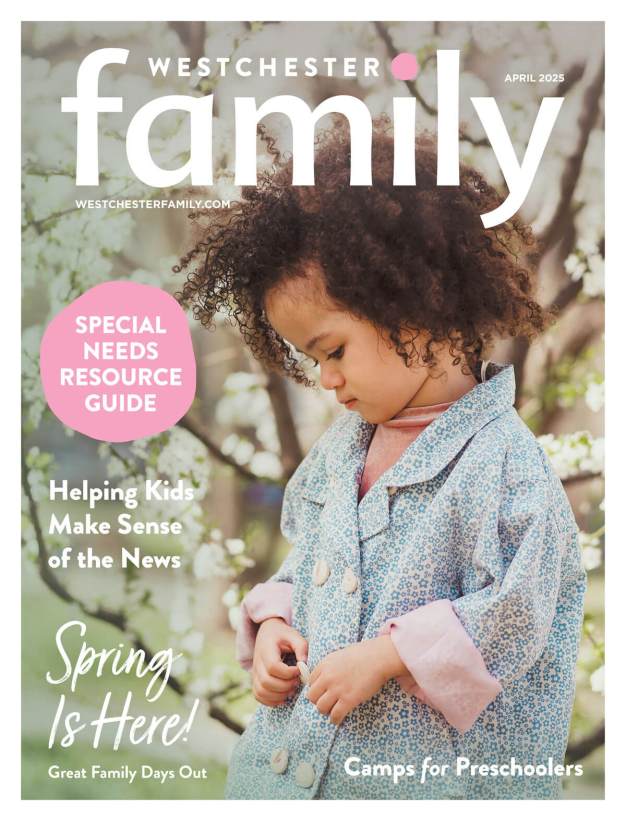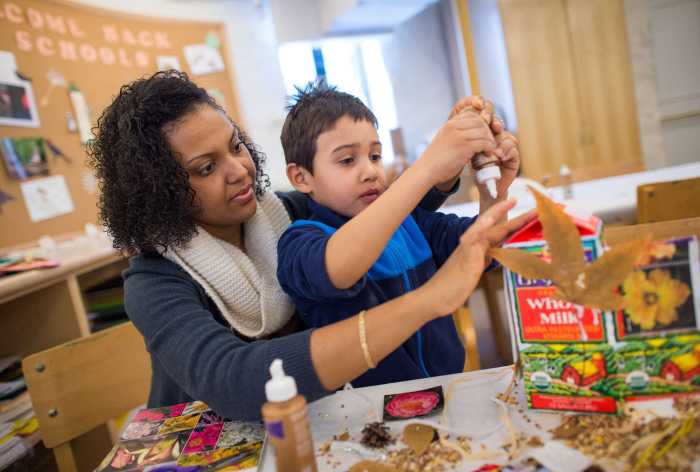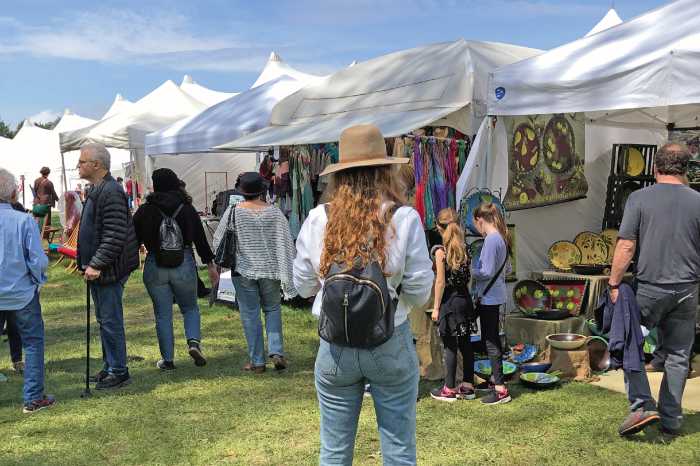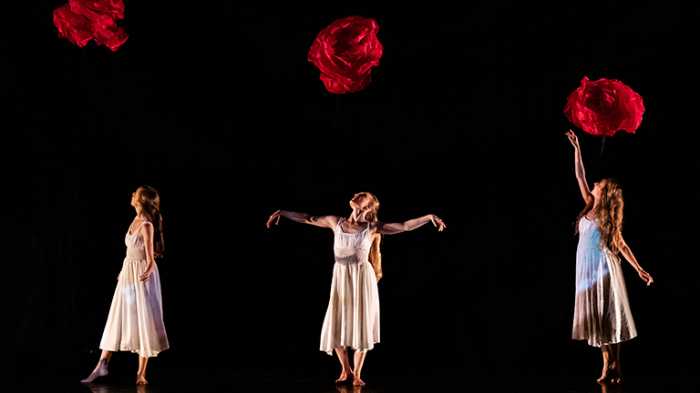“We chose Montessori because we wanted our toddler to experience independence and develop confidence. For our daughter that has meant, “I can do it” and “I want to do it!” — B. Patel, Montessori parent
How do Montessori programs foster independence in toddlers? From a very young age, children are supported in learning to do things for themselves, rather than having things done for them. Montessori teachers give toddlers “just enough help.” In this way, the environment helps toddlers develop confidence by actually learning how to do things for themselves.
Being independent lays the foundation for a strong sense of self and for having healthy relationships later in life. Toddlers learn to take off and put on their coat and their shoes. They learn how to wipe the mucus from their nose. They learn how to wash their hands and how to use the toilet. Toddlers learn how to pour a drink into a cup, how to carry a tray, how to safely carry a chair. Toddlers also learn how to clean up a spill, because spills can happen. In this way, toddlers are free to move around the environment: to get a drink of water whenever they are thirsty; to move the chair if they want to sit in another spot; to safely carry their activities from the shelf to the table or floor. Toddlers feel a sense of connection to the larger community because they contribute to the whole: by setting up lunch, watering the plants, putting their work away when they have completed it if they are able, and giving assistance to a friend.
The teacher’s role
A Montessori toddler program is based on Dr. Montessori’s ideas and writing, which reflect the importance of meeting the development needs of toddlers and the importance of creating a prepared learning environment to meet those specific needs. The head teacher in a Montessori toddler program has had training in children ages birth to 3 and holds a Montessori teaching credential for that age group. This training informs not only the specific design of the environment, it also guides the adult in the practices and techniques for working with very young children, as well as the art of observation and the process of ongoing self-reflection.
The adult is seen as a guide, rather than teacher. She designs and creates a safe environment that supports and encourages exploration. She chooses beautiful, natural, and engaging materials that invite curious and joyful learning. She models a calm demeanor with interactions that foster cooperative social interaction. The adults in the environment model the acceptance of mistakes as a natural part of learning and growth without judgment, criticism, or negative facial expressions.
Coordination, choice, and the real world
The toddlers move about freely in their Montessori environment in order to develop physical coordination and support freedom of choice. They may lift heavy objects and carry them from one place to another. They are free to exercise their muscles as needed, not only at a specific time for “gym” or “movement”, because within the classroom there are places to jump, spin, and experiment with balance, such as bars to pull up on, a small step to climb or a rocking boat. In this way, toddlers are able to strengthen their core muscles, practice balance, and develop muscle coordination.
The Montessori classroom is dedicated to discovery of the real world rather than opportunities for pretend play. The Montessori toddler learns to safely use the tools of the hand, for instance – a fork, spoon, scissors, writing utensils, screwdriver, hammer, and paintbrush. Rather than play in a make-believe kitchen, the toddlers cut their banana for snack or peel and slice an egg at lunch. Instead of playing in the dress up corner, the toddlers engage in learning how to dress themselves, by practicing with a button or zipper, and by putting on and taking off clothing.
Giving the gift of time
Traditionally, adults often show their love by doing things for the child, such as picking them up and carrying them from one place to another, putting on their coat, wiping their nose. Adults are efficient and want to get things done as quickly as possible. For toddlers the goal is not to get it done quickly, but rather to learn how to do it by themselves. It is the greatest gift we can give a child, to slow down and patiently give them the time they need. Whether that means walking slowly, waiting without speaking to allow a child time to let the words come, or dealing with a little bit of mess because the child poured their own milk, Montessori teachers show their care for the child by helping the child to gain independence: modeling and showing how to do things, patiently breaking tasks down into smaller steps, and giving child-size tools to enable the child to succeed, to help the child to do it themselves.
Hallmarks of Montessori
One of the hallmarks of the Montessori program is a schedule that preserves a long, uninterrupted “work” time to support the development of concentration and to allow spontaneous activity. The child is not guided or directed, following a predetermined schedule or required activities. Another hallmark is that the program takes a child-centered view of children: giving them freedom to explore the space and select their own activities of individual interest. An array of hands-on materials is available to attract and engage the toddler. This fosters concentration, develops problem-solving skills, and encourages intrinsic motivation.
The activities are designed to enable children to recognize when the task has been completed successfully, rather than be dependent on the adult for validation or correction. The materials and activities are beautiful, many made of natural materials, such as wood, and with as little plastic as possible. Activities and interactions enhance a spirit of generosity, awe, and wonder, with opportunities to provide meaningful help to others. The toddler has experiences designed to cultivate a love for nature, such as planting seeds, collecting pine cones, and sorting sea shells.
“The classroom setup, as well as the teachers, really allow each child to develop their own individual skills and talents. Every day, I am amazed at what I see the children doing – from serving and clearing their own food, to caring for plants, and even making their own soap. More importantly, they all seem so happy and fulfilled.”
— W. Baldwin, Montessori parent
Language and environment
From the moment of their birth, babies are absorbing language and developing their receptive language skills. During the first three years of a child’s life, they literally transform from an infant who cries to a child who speaks more than 200 words. A Montessori toddler environment is rich with words and language, with many opportunities to name objects, parts of the body, animals, foods, plants, colors, instruments, and tools. Surrounding toddlers with a fertile language environment, without it being loud or overwhelming, and also providing times of silence and quiet, encourages their natural tendency to develop receptive and expressive language abilities.
We know that infants and toddlers are easily over-stimulated by sensory input, but the soothing, calming atmosphere of the Montessori toddler classroom provides a safe haven. It is the quality of calm in the classroom, combined with enabling the toddlers to do as much as possible for themselves, that makes Montessori toddlers so content. The environment is a peaceful, caring, joyful place for learning, connection, and the development of independence. It seems far removed from the tantrums and struggles of a time known as the “terrible” twos. In fact, Montessori toddler teachers love this time of life and are dedicated to making it a truly remarkable time for the children in their care.
“When my daughter was first learning to separate from me, she naturally gravitated toward working with the baby dolls (holding, swaddling, and washing) in a way that allowed her to be the nurturer. Her teachers encouraged her, which not only gave her a sense of calm and happiness in her brand-new environment, but also contributed to her feeling that she had a special job while at school. It is clear to our family that the Montessori principles are helping our daughter to flourish and prepare her for independence, self-awareness, and lifelong learning.”
— K. Zanot, Montessori parent
K.T. Korngold is the director of the Montessori Children’s Center, one of the first full-time, year-round Montessori childcare centers in the United States. The newly opened location in West Harrison, N.Y. provides Montessori childcare for children from ages 3 months to 6 and has rolling admissions as spaces become available. She is the CEO of the Center for Montessori Education|NY (CME|NY), a pioneer in Montessori teacher and administrator education, which offers Infant and Toddler (0-3) and Early Childhood (3-6) teacher education training and training for Montessori School Administrators for an American Montessori Society credential.
K.T will be traveling to Hanoi, Vietnam in November 2019 to offer a course in Montessori Infant and Toddler teacher education.















